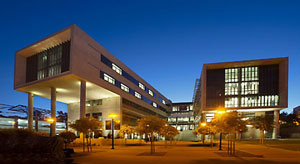The University of California, San Diego’s San Diego Supercomputer Center (SDSC) has been distinguished with a LEED Gold certification, awarded for its SDSC East building expansion. The LEED Gold certification was presented by the USGBC.
 San Diego Supercomputer Center East Building, UC San Diego. Photo: Alan Decker
San Diego Supercomputer Center East Building, UC San Diego. Photo: Alan Decker
Of all the achievements received by the UC San Diego campus, the SDSC East Building is the first construction to win the Gold certification for its group of existing building. So far, six buildings have been presented with LEED Gold certification in the Commercial Interiors and New Construction categories. The latest awards include the Gold award for the Village@Torrey Pines East, North Campus Housing, Phase 2 project. Overall, the SDSC is the ninth building on campus to achieve a LEED certification.
The new structure has two wings and five levels creating a V-shaped floorplan. The size of the existing supercomputer center has been enhanced with its Organized Research Unit measuring 160,000 sq.ft. The maximum utilization of natural day lighting, efficient water fixture installations, a broad recycling program, and environmentally responsible cleaning and landscape maintenance programs amount to the significant Green features of the SDSC East building.
The employees at SDSC have been operating consistently to develop the SDSC East building’s sustainable operations, which also contain a 4,500 sq.ft data center that includes a large number of racks of high-performance computers. This forms an important part of the Co-Location program of the university. Researchers throughout the campus have been encouraged to place their computer hardware at SDSC, thus controlling UC economies-of-scale and investments, while offering low-cost services.
Source: http://www.sdsc.edu/